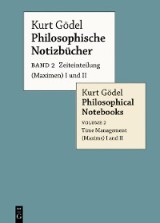Details

Zeiteinteilung (Maximen) I und II / Time Management (Maxims) I and II
1. Aufl.
|
149,95 € |
|
| Verlag: | De Gruyter |
| Format: | |
| Veröffentl.: | 07.12.2020 |
| ISBN/EAN: | 9783110686586 |
| Sprache: | deutsch |
| Anzahl Seiten: | 556 |
DRM-geschütztes eBook, Sie benötigen z.B. Adobe Digital Editions und eine Adobe ID zum Lesen.
Beschreibungen
<p>Over a period of 22 years (1934–1955), mathematician Kurt Gödel put down a series of philosophical remarks – the so-called Philosophical Maxims (Max Phil) – in writing. They have been passed down in 15 notebooks written in Gabelsberger shorthand. The first notebook contains general philosophical reflections, while the second and third notebooks consist of Gödel’s applied individual ethics. The notebooks that follow show that Gödel developed a philosophy of science in which he placed his considerations of physics, psychology, biology, mathematics, language, theology, and history within the context of a particular metaphysics. Now for the first time ever, a complete, historical-critical edition of Gödel’s philosophical notebooks is being prepared by the Kurt Gödel Research Center of the Berlin-Brandenburg Academy of Sciences and Humanities. One volume will be published yearly as part of this series. </p>
<p>Volume 2 contains both notebooks of "Time Management (Max) I and II" and thereby Gödel’s applied individual ethics, which he received among others through his teacher Heinrich Gomperz. Gödel thus incorporates the ethical ideal of self-perfection into his opus. The volume is prefaced by an introduction to relevant considerations from the ethics of the Stoics as well as ancient dietetics, which provide the philosophical background to understand Gödel’s approach. In addition, editor Eva-Maria Engelen presents how this fits into the context of Gödel’s <em>Philosophical Notebooks</em>. </p>
<p>Volume 2 contains both notebooks of "Time Management (Max) I and II" and thereby Gödel’s applied individual ethics, which he received among others through his teacher Heinrich Gomperz. Gödel thus incorporates the ethical ideal of self-perfection into his opus. The volume is prefaced by an introduction to relevant considerations from the ethics of the Stoics as well as ancient dietetics, which provide the philosophical background to understand Gödel’s approach. In addition, editor Eva-Maria Engelen presents how this fits into the context of Gödel’s <em>Philosophical Notebooks</em>. </p>
<p>Der Mathematiker Kurt Gödel hat über einen Zeitraum von 22 Jahren (1934–1955) philosophische Bemerkungen, die so genannten Maximen Philosophie (Max Phil), niedergeschrieben. Sie sind in 15 Notizbüchern in der Kurzschrift Gabelsberger überliefert. Das erste Heft enthält allgemeine philosophische Überlegungen, die Hefte zwei und drei bestehen aus Gödels angewandter Individualethik. Die dann folgenden zeigen, dass Gödel eine Wissenschaftsphilosophie entworfen hat, in der er seine Erörterungen zu Physik, Psychologie, Biologie, Mathematik, Sprache, Theologie und Geschichte in den Kontext einer Metaphysik stellt. Erstmals wird nun an der Kurt-Gödel-Forschungsstelle der Berlin-Brandenburgischen Akademie der Wissenschaften eine vollständige, historisch-kritische Edition von Gödels Philosophischen Notizbüchern vorbereitet. Im Rahmen dieser Edition erscheint jährlich ein Band.</p>
<p>Band 2 enthält die beiden Hefte ›Zeiteinteilung (Maximen) I und II‹ und damit Gödels angewandte Individualethik, welche er unter anderem über seinen Lehrer Heinrich Gomperz rezipiert hat. Gödel verbindet damit das ethische Ideal der Selbstvervollkommnung. Vorangestellt ist eine Einführung in relevante Überlegungen dazu aus der Ethik der Stoa sowie aus der antiken Diätetik, vor deren Hintergrund sich Gödels Vorgehensweise verstehen lässt. Zudem wird von der Herausgeberin dargelegt, inwiefern sich das in den Zusammenhang der Philosophischen Notizbücher Gödels einfügt. </p>
<p>Band 2 enthält die beiden Hefte ›Zeiteinteilung (Maximen) I und II‹ und damit Gödels angewandte Individualethik, welche er unter anderem über seinen Lehrer Heinrich Gomperz rezipiert hat. Gödel verbindet damit das ethische Ideal der Selbstvervollkommnung. Vorangestellt ist eine Einführung in relevante Überlegungen dazu aus der Ethik der Stoa sowie aus der antiken Diätetik, vor deren Hintergrund sich Gödels Vorgehensweise verstehen lässt. Zudem wird von der Herausgeberin dargelegt, inwiefern sich das in den Zusammenhang der Philosophischen Notizbücher Gödels einfügt. </p>
<strong>Eva-Maria Engelen</strong>, Berlin-Brandenburg Academy of Sciences and Humanities, Berlin.
Diese Produkte könnten Sie auch interessieren:

Karl Schuhmann, Selected papers on phenomenology

von: Karl Schuhmann, Cees Leijenhorst, Piet Steenbakkers

149,79 €















